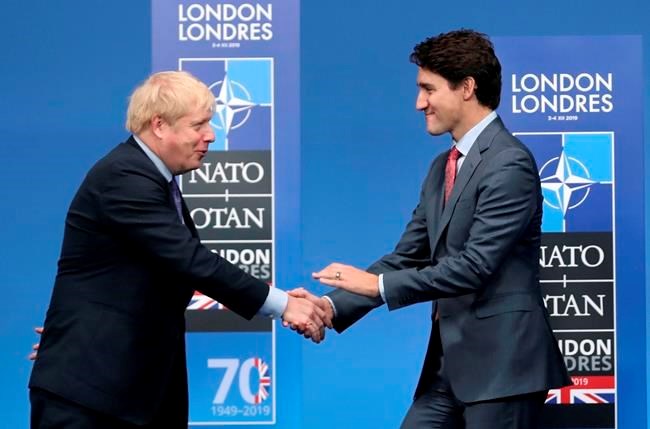OTTAWA — British Prime Minister Boris Johnson will host Justin Trudeau and their G7 counterparts for a virtual leaders' summit today aimed at bringing renewed momentum to COVID-19 vaccine distribution.
Johnson will be calling on G7 leaders to increase their funding for the COVAX Facility, which aims to distribute vaccines to poorer countries.
Johnson confirmed Britain will be sending all of its surplus vaccines to COVAX, a development that could place Trudeau in a hot seat because Canada is the only G7 country using its membership in the program to get extra vaccines for its own population.
The Liberals have been under fire from international organizations and some opposition parties for the decision to accept 1.9 million doses of vaccine from COVAX for domestic use in Canada by the end of June.
Trudeau has defended the decision on the grounds that countries that contribute to COVAX are allowed to receive vaccines of their own and he has noted that Canada is one of the leading contributors to international program.
COVAX is a partnership created last year under the World Health Organization to help deliver billions of expensive vaccine doses to poor countries that can't afford them.
Canada has pledged $220 million to COVAX and another $865 million to the ACT Accelerator, which tries to ensure low- and middle-income countries have equitable access to medical treatments during the pandemic. Britain has pledged $971 million to COVAX.
Canada has faced shortfalls in deliveries of vaccines in recent weeks, but Trudeau has said they are scheduled to ramp up again. He also says it is too soon to say what Canada will do with any excess vaccines, but that Canada is committed to helping end the pandemic everywhere because that is in Canada's interest.
Johnson, who himself became seriously ill after contracting COVID-19 last year, is using Britain's presidency of the G7 this year to drive a health plan that would enable the speedy creation of new vaccines to combat other deadly diseases and pandemics that might emerge in the future.
Johnson wants the G7 to endorse a target to cut the time to develop new vaccines by two-thirds, from 300 days to 100 days.
Johnson wants the WHO and the Coalition for Epidemic Preparedness Innovations, or CEPI, to find ways to speed up vaccine development as well as treatments and tests for common pathogens.
"Perhaps more than ever, the hopes of the world rest on the shoulders of scientists and over the last year, like countless times before, they have risen to the challenge," Johnson said in a pre-summit statement.
"The development of viable coronavirus vaccines offers the tantalizing prospect of a return to normality, but we must not rest on our laurels. As leaders of the G7 we must say today: never again," he added.
"By harnessing our collective ingenuity, we can ensure we have the vaccines, treatments and tests to be battle-ready for future health threats, as we beat COVID-19 and build back better together."
Johnson also wants G7 leaders to support a new treaty on pandemic preparedness that would be administered through the WHO.
The meeting will be the first G7 leaders' meeting since last April, when they convened for an emergency virtual gathering as the pandemic was sweeping the globe.
The regular 2020 annual leaders' summit, which was to have been hosted by former U.S. president Donald Trump, was ultimately scrapped as America battled with a surging death count due to COVID-19.
This report by The Canadian Press was first published Feb. 19, 2021.
Mike Blanchfield, The Canadian Press



